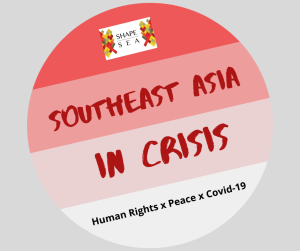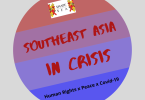Arif R. HaryonoStudent, Asia Pacific MA Human Rights and DemocratisationGlobal Campus of Human Rights Asia PacificInstitute of Human Rights and Peace Studies, Mahidol University
 Indonesia’s plan to enact the New Normal, or as the government paraphrases it, ‘coexist with COVID-19’, will cause more harm to healthcare workers. Indonesia is facing multiple obstacles in managing the pandemic: shortfall of healthcare workers, protection mechanisms, and equipment, the under-capacity of Indonesia’s health system, and the ignorance of the population itself of the surge of COVID-19. The New Normal that the government is forcefully imposing will not only violate the right to health of the citizens but also put the healthcare workers in a dreadful position: the sacrificial lamb of God.State NegligencePrior to COVID-19, many epidemiologists and civil societies had warned the government of Indonesia of the effects of this pandemic. They also urged for efficiency and preparedness towards severe effects that might occur throughout the country. Unfortunately, many government officials responded nonchalantly. Instead of preparing the public health sector and other sectors related to the upcoming epidemic, government officials underestimated the virus and preferred to allocate the state’s budget to boost the tourism sector. The rest is history. Until 27 May, more than 23,851 were infected by the deadly virus, with the death toll continuing to surge up to 1,473 death cases (Worldometers, 2020). Indonesia has one of the highest death rates of COVID-19 in the region.Government negligence in conducting early preparation for a pandemic has made Indonesia’s public health sector crumble. Personal Protective Equipment (PPE) is an essential tool to protect front-line workers from being infected by the virus (Schwartz et al., 2020. pp. 2-3). Unfortunately, only doctors and nurses who work in the Government referral hospitals can access a sufficient supply of PPE. As of March 2020, the Ministry of Health only appointed 132 COVID-19 referral hospitals serving 514 districts/cities in Indonesia, which raises the possibility of under-capacity of the health sector in treating patients with COVID-19.As opposed to healthcare workers in government-based hospitals, healthcare workers in small private hospitals and community-based health facilities (puskesmas or Community Health Centers) do not have the privilege of having sufficient numbers of PPE. They have to rely on public donations to provide them with medical supplies. Furthermore, they have to be creative under the conditions by using cheap raincoats, sharing, and re-using equipment which possibly exposes them to a greater threat. An example of a threat that befalls healthcare workers is when an unknowingly-asymptomatic COVID-19 patient consults with a doctor in health facilities. Since the supply of face masks is limited, the doctor cannot use it while treating the unknowingly-infected patient, thus exposing healthcare workers to the virus (Purnamasari, 2020; Setiawan, 2020). The government’s failure to ensure an equal distribution of PPE has caused a higher death rate among healthcare workers. By May 2020, the death rate of healthcare workers in Indonesia has reached 6-7 deaths per 100 cases, compared to the world average of only 0.37 percent (Pusparisa, 2020).Unjustified StanceThe pandemic preventive procedures require the population to conduct strict physical distancing. This policy causes economic hindrance to many people, particularly the low-middle income and the blue-collar workers. Apparently, the state is also unable to withstand the economic pressure any longer. President Joko Widodo has suggested the nation stay productive despite the fact that the virus is still around (Adjie, 2020). Government officials will soon declare a relaxation of the social restrictions by re-opening the economic centers, workplaces, markets, malls, hotels, etc. (Gorbiano and Loasana, 2020). The New Normal is a concept of living normally but with COVID-19 procedures in the public sphere, such as wearing a mask, regularly washing the hands, physically distancing on queue, avoiding crowds as much as possible, and so on.The writer believes that enacting The New Normal just because the government cannot endure the economic pressure is an unjustified reason. Not only will it re-expose the citizens to COVID-19 but it will also violate and abuse the rights of safety, security, and the well-being of healthcare workers. Even with the Large-Scale Social Restrictions (PSBB) that are already enacted in several cities in Indonesia, the numbers of infected people have not yet declined. Instead of relaxing the PSBB, the writer argues the government should reinforce the PSBB until it reaches a phase when new cases per day reach zero. The government also needs to ensure the equal distribution of PPE to all healthcare workers without any distinction whatsoever. During the crisis, protecting the lives of its citizens, especially the frontline workers who work tirelessly each day should be the top priority of every leader. Otherwise, there is no use of having a government at all.References:Adjie, M.F.P., 2020. ‘Let’s Coexist With Covid-19’: Jokowi Calls On Residents To Adapt To New Normal. The Jakarta Post . Available at: <https://www.thejakartapost.com/news/2020/05/16/lets-coexist-with-covid-19-jokowi-calls-on-residents-to-adapt-to-new-normal.html> .Gorbiano, M. I., Loasana, N. A., 2020. Indonesia Exploring to Ease Social Restrictions. The Jakarta Post . Available at: <https://www.thejakartapost.com/news/2020/05/18/indonesia-exploring-options-to-ease-social-restrictions.html> .Purnamasari, Y., 2020. Interview on COVID-19 and Health Sector. Interviewed by Arif R. Haryono. . Yogyakarta, 22 April 2020, 14:00-14:30.Pusparisa, Y., 2020. Tingkat Kematian Tenaga Kesehatan Indonesia Mencapai 6,5%. Katadata.co.id . Available at: <https://databoks.katadata.co.id/datapublish/2020/05/15/tingkat-kematian-tenaga-kesehatan-indonesia-mencapai-65> Setiawan, Y., 2020. Interview on COVID-19 and Health Sector. Interviewed by Arif R. Haryono. . Yogyakarta, 21 April 2020, 10:00-11:00.Schwartz, J., King, C., Yen, M., 2020. Protecting Healthcare Workers During Coronavirus Disease 2019(COVID-19) Outbreak: Lessons from Taiwan’s Severe Acute Respiratory Syndrome Response. Clinical Infectious Diseases, Brief Report. Oxford University Press. Available at: <https://doi.org/10.1093/cid/ciaa255> Worldmeters, 2020. Report Coronavirus Cases. World Meters Info. . Available at: <https://www.worldometers.info/coronavirus/>. .
Indonesia’s plan to enact the New Normal, or as the government paraphrases it, ‘coexist with COVID-19’, will cause more harm to healthcare workers. Indonesia is facing multiple obstacles in managing the pandemic: shortfall of healthcare workers, protection mechanisms, and equipment, the under-capacity of Indonesia’s health system, and the ignorance of the population itself of the surge of COVID-19. The New Normal that the government is forcefully imposing will not only violate the right to health of the citizens but also put the healthcare workers in a dreadful position: the sacrificial lamb of God.State NegligencePrior to COVID-19, many epidemiologists and civil societies had warned the government of Indonesia of the effects of this pandemic. They also urged for efficiency and preparedness towards severe effects that might occur throughout the country. Unfortunately, many government officials responded nonchalantly. Instead of preparing the public health sector and other sectors related to the upcoming epidemic, government officials underestimated the virus and preferred to allocate the state’s budget to boost the tourism sector. The rest is history. Until 27 May, more than 23,851 were infected by the deadly virus, with the death toll continuing to surge up to 1,473 death cases (Worldometers, 2020). Indonesia has one of the highest death rates of COVID-19 in the region.Government negligence in conducting early preparation for a pandemic has made Indonesia’s public health sector crumble. Personal Protective Equipment (PPE) is an essential tool to protect front-line workers from being infected by the virus (Schwartz et al., 2020. pp. 2-3). Unfortunately, only doctors and nurses who work in the Government referral hospitals can access a sufficient supply of PPE. As of March 2020, the Ministry of Health only appointed 132 COVID-19 referral hospitals serving 514 districts/cities in Indonesia, which raises the possibility of under-capacity of the health sector in treating patients with COVID-19.As opposed to healthcare workers in government-based hospitals, healthcare workers in small private hospitals and community-based health facilities (puskesmas or Community Health Centers) do not have the privilege of having sufficient numbers of PPE. They have to rely on public donations to provide them with medical supplies. Furthermore, they have to be creative under the conditions by using cheap raincoats, sharing, and re-using equipment which possibly exposes them to a greater threat. An example of a threat that befalls healthcare workers is when an unknowingly-asymptomatic COVID-19 patient consults with a doctor in health facilities. Since the supply of face masks is limited, the doctor cannot use it while treating the unknowingly-infected patient, thus exposing healthcare workers to the virus (Purnamasari, 2020; Setiawan, 2020). The government’s failure to ensure an equal distribution of PPE has caused a higher death rate among healthcare workers. By May 2020, the death rate of healthcare workers in Indonesia has reached 6-7 deaths per 100 cases, compared to the world average of only 0.37 percent (Pusparisa, 2020).Unjustified StanceThe pandemic preventive procedures require the population to conduct strict physical distancing. This policy causes economic hindrance to many people, particularly the low-middle income and the blue-collar workers. Apparently, the state is also unable to withstand the economic pressure any longer. President Joko Widodo has suggested the nation stay productive despite the fact that the virus is still around (Adjie, 2020). Government officials will soon declare a relaxation of the social restrictions by re-opening the economic centers, workplaces, markets, malls, hotels, etc. (Gorbiano and Loasana, 2020). The New Normal is a concept of living normally but with COVID-19 procedures in the public sphere, such as wearing a mask, regularly washing the hands, physically distancing on queue, avoiding crowds as much as possible, and so on.The writer believes that enacting The New Normal just because the government cannot endure the economic pressure is an unjustified reason. Not only will it re-expose the citizens to COVID-19 but it will also violate and abuse the rights of safety, security, and the well-being of healthcare workers. Even with the Large-Scale Social Restrictions (PSBB) that are already enacted in several cities in Indonesia, the numbers of infected people have not yet declined. Instead of relaxing the PSBB, the writer argues the government should reinforce the PSBB until it reaches a phase when new cases per day reach zero. The government also needs to ensure the equal distribution of PPE to all healthcare workers without any distinction whatsoever. During the crisis, protecting the lives of its citizens, especially the frontline workers who work tirelessly each day should be the top priority of every leader. Otherwise, there is no use of having a government at all.References:Adjie, M.F.P., 2020. ‘Let’s Coexist With Covid-19’: Jokowi Calls On Residents To Adapt To New Normal. The Jakarta Post . Available at: <https://www.thejakartapost.com/news/2020/05/16/lets-coexist-with-covid-19-jokowi-calls-on-residents-to-adapt-to-new-normal.html> .Gorbiano, M. I., Loasana, N. A., 2020. Indonesia Exploring to Ease Social Restrictions. The Jakarta Post . Available at: <https://www.thejakartapost.com/news/2020/05/18/indonesia-exploring-options-to-ease-social-restrictions.html> .Purnamasari, Y., 2020. Interview on COVID-19 and Health Sector. Interviewed by Arif R. Haryono. . Yogyakarta, 22 April 2020, 14:00-14:30.Pusparisa, Y., 2020. Tingkat Kematian Tenaga Kesehatan Indonesia Mencapai 6,5%. Katadata.co.id . Available at: <https://databoks.katadata.co.id/datapublish/2020/05/15/tingkat-kematian-tenaga-kesehatan-indonesia-mencapai-65> Setiawan, Y., 2020. Interview on COVID-19 and Health Sector. Interviewed by Arif R. Haryono. . Yogyakarta, 21 April 2020, 10:00-11:00.Schwartz, J., King, C., Yen, M., 2020. Protecting Healthcare Workers During Coronavirus Disease 2019(COVID-19) Outbreak: Lessons from Taiwan’s Severe Acute Respiratory Syndrome Response. Clinical Infectious Diseases, Brief Report. Oxford University Press. Available at: <https://doi.org/10.1093/cid/ciaa255> Worldmeters, 2020. Report Coronavirus Cases. World Meters Info. . Available at: <https://www.worldometers.info/coronavirus/>. .





